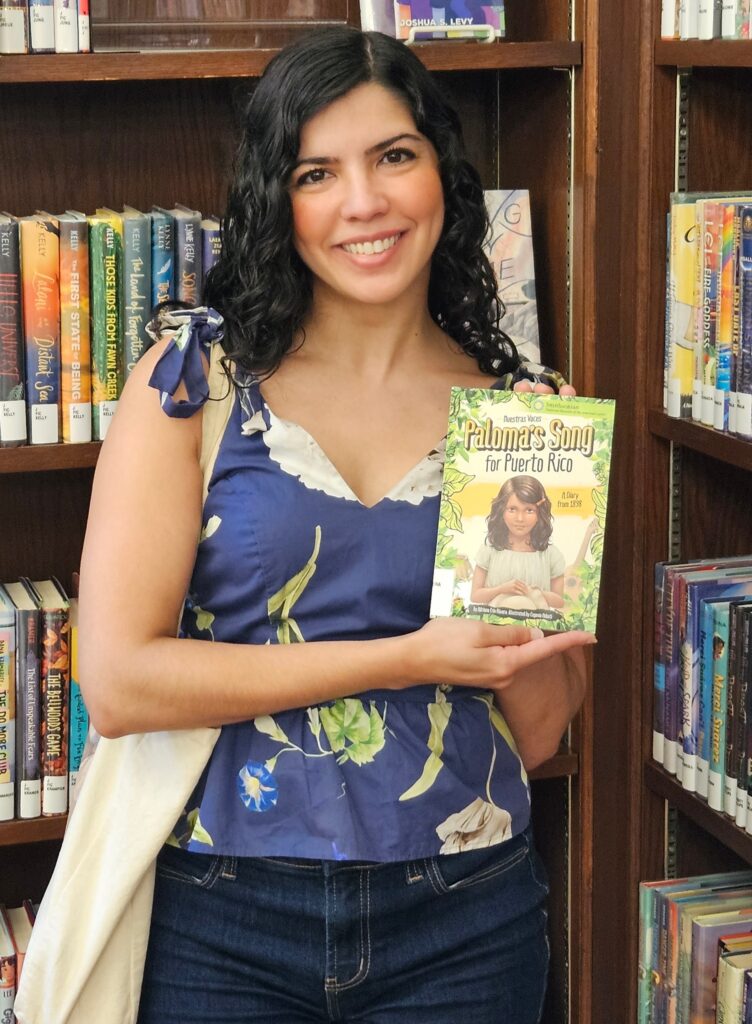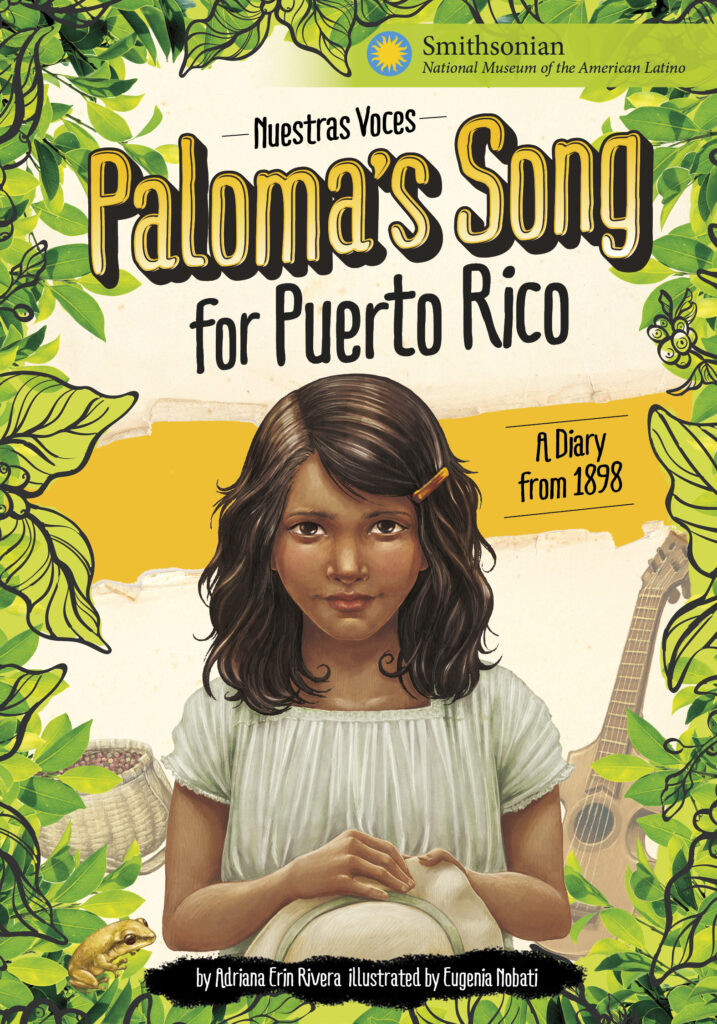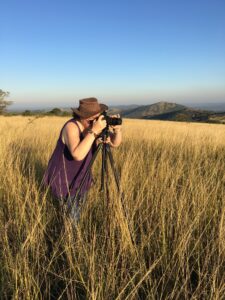In a world where stories shape our understanding of history and identity, Adriana Erin Rivera stands as a beacon of inspiration. Her recent work, Paloma’s Song for Puerto Rico: A Diary from 1898, is not just a historical account; it’s a heartfelt journey through the eyes of a young girl navigating a turbulent time in Puerto Rican history. Through her unique blend of research and personal reflection, Adriana brings to life the vibrant culture, struggles, and resilience of her heritage. In this interview, we dive into the creative process behind her book, explore the profound impact of her childhood experiences, and discuss the importance of sharing cultural narratives that resonate with young readers today. Join us as we uncover the passion and purpose that drive Adriana’s storytelling, and discover how she empowers others to embrace their own cultural identities.
- What inspired you to write Paloma’s Song for Puerto Rico: A Diary from 1898?

My inspiration for writing PALOMA’S SONG FOR PUERTO RICO: A DIARY FROM 1898 felt like a burst of creative energy. When I was first approached by my publisher about this project in collaboration with the Smithsonian Institution, I knew the stakes would be high. I was given a few basic parameters for the story: a 12-year-old girl, in Puerto Rico, during 1898, and written in diary format. Immediately, my wheels started turning!
1898 was during the Spanish American War, which led to the island of Puerto Rico becoming a colony of the United States (today, it is a territory of the United States). It was a challenging time in Puerto Rico’s history, so I knew that needed to be handled gingerly and with knowledge. I did a lot of research. Then, I thought about my own past experiences writing in diaries as a 12-year-old and how personal that is for a young girl. The book couldn’t only be about war, so I also considered having the main character be inspired by a creative outlet. I settled on music since that is such an integral part of Puerto Rican culture. I even wrote an original song for the book that ties the themes together. Paloma’s name, meaning “dove” in Spanish tied into the concepts of song and freedom. Through this brainstorming, I crafted a basic synopsis and outline. The story began from there.
2. How did your childhood experiences on your abuelo’s farm influence the narrative of your book?
I grew up in New Jersey. Visiting my abuelo’s farm in Aguadilla, Puerto Rico over summers was a fun escape for me. He had goats, chickens, and cows and they were all my friends as a kid. I felt a close connection with that farm, just as Paloma has with her family’s farm in Ponce. I remembered fondly what it felt like to see Puerto Rico through a child’s eyes – the lush landscape, the colorful houses, the color of the ocean, the sound of the coquí frogs at night. I wanted my readers to experience that through the book. And Paloma sees some things for the first time in this story. I wanted readers to see what she sees on every page.
3. How did learning about Puerto Rico’s history during the Spanish American War affect your personal perspective as a Latina of Puerto Rican descent?
Researching the Spanish American War in the context of Puerto Rico’s history was eye-opening. I wasn’t taught this piece of the history in school. It’s history that not enough people know. I had a lot to learn. But I know that learning your history helps shape and inform who you are. I feel like all the research and knowledge I gained in the process of writing this book made me even more proud to be a Latina of Puerto Rican descent. I have immense respect for my ancestors and those who came before me to fight injustices relating to Puerto Rico and Puerto Ricans and I know there is a lot more work to do.
4. What was the most rewarding aspect of writing a book that brings attention to a lesser-known piece of history?
It’s so rewarding when people finish the book and have increased empathy for the Puerto Rican people and our struggles and challenges both on the island and the mainland United States. After one reading Q&A a third grader asked me “Why is Puerto Rico still not free?” That was so insightful from such a young reader. If after reading my book, more people are inspired to inquire about what happened to Puerto Rico during the Spanish American War and what’s going to happen to the island and its people in the future, I think I’ve done my job.
One piece of lesser-known history that lots of people are stunned to learn is that there was once a law that prohibited Puerto Ricans from displaying our flag on the island or the mainland United States (the law was repealed in 1957). People were fined and even jailed for waving a Puerto Rican flag. This isn’t traditionally taught in the US K-12 curriculum. It takes writing engaging historical fiction books for kids to learn about these injustices.
5. Can you share a memorable moment or piece of feedback you received about your book?
I’m still floored when I hear from people I don’t know that they’ve read the book and really enjoyed it. I know I shouldn’t, but I read the reviews and I’ve been amazed at how well PALOMA’S SONG FOR PUERTO RICO has been received. I appreciate all of the love for the book. I think the best feedback came from my dad, though. When he finished the book, he had tears in his eyes. It was emotional for him because he recognized this was also the story of our ancestors – kind of our origin story. I included a lot of family Easter eggs within the narrative. While it’s historical fiction, it was a deeply personal book. My dad’s reaction was the best review I could ask for.

6. What advice would you give to other women who want to write about their cultural heritage or historical topics?
As women, it’s important that we support and build each other up in our endeavors. I absolutely encourage other women to write about their cultural heritage. It’s empowering to know more your history and culture. I would advise other writers to do their homework whether it comes from visiting your family’s homeland or listening to stories from your elders, and dig into the research. Some people say the truth will set you free. I don’t know if that’s entirely true, but it certainly will inspire you.
7. What future projects or books are you working on, and how do you plan to continue exploring themes of cultural heritage?
When I was a kid, I didn’t see a lot of books with young Latina characters on the front cover. So, when I wrote PALOMA’S SONG FOR PUERTO RICO, I was so excited to have a little Puerto Rican girl displayed on the cover! I write stories about Puerto Rican girls to inspire Puerto Rican girls to read and write their stories. I have some other projects in the works and I’ll continue to focus on the themes of Puerto Rican cultural heritage. It’s so multifaceted and there are plenty more stories to tell!
8. How has your journey as a writer shaped your understanding of yourself and your cultural identity?
Even as a kid, my parents instilled in me pride in being Latina and my Puerto Rican heritage. But I didn’t really have Latina friends growing up. So, I shied away from waving my flag, so to say, for a long time. Figuring out where I fit as a Latina in rooms where there aren’t many or any of us has always been a challenge. I’m sure a lot of Latinas can relate to that. As an adult, I’ve recognized that being Latina is a superpower. As I write more books, I feel like that power is getting stronger.
IG/Threads/TikTok: @therealadrianaerin






